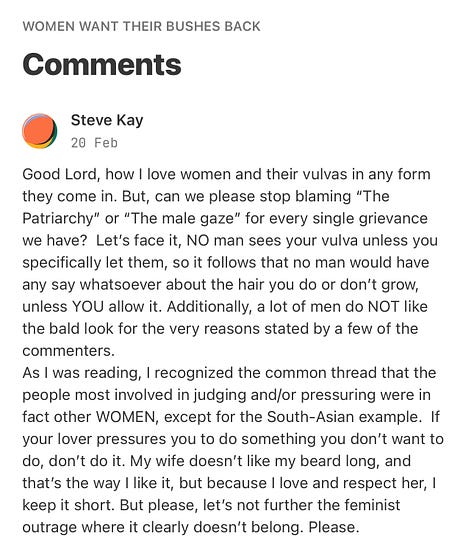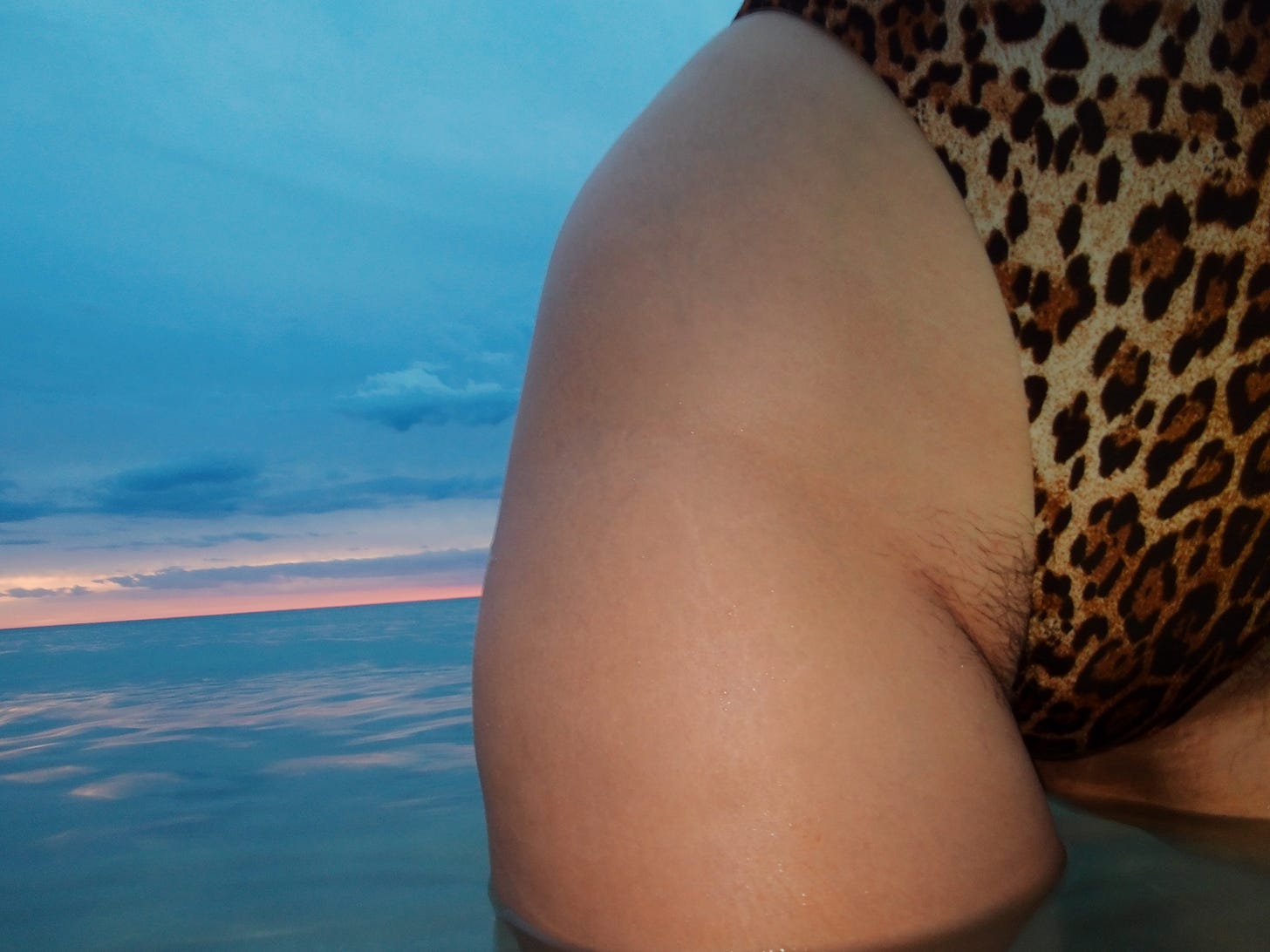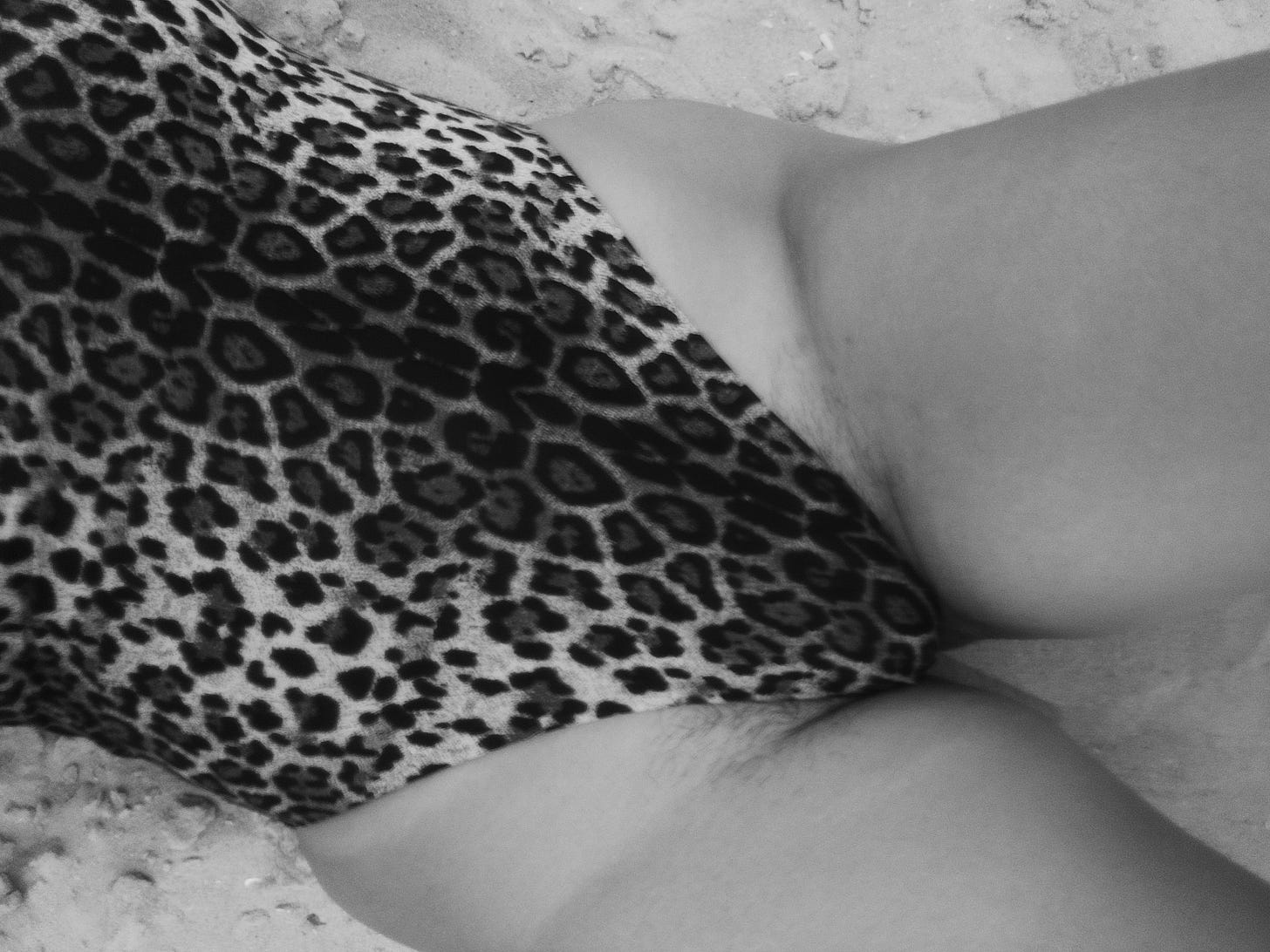if pubes are personal preference, why are most of us hairless?
we aren't immune to the society that created us
“Let’s not further feminist outrage where it doesn’t belong”, read a comment on my latest newsletter titled women want their bushes back. The commentor, Steve, was imploring that we “stop blaming ‘the patriarchy’ or ‘the male gaze’ for every single grievance we have” going on to argue that “NO man sees your vulva unless you let them” which means that “no man would have any say whatsoever about the hair you do or don’t grow unless YOU allow it”.
Steve is one of the many men that have reached out to me since my initial piece—full bush in a bikini—caused a scene on Substack. They feel attacked by my reference of ‘the patriarchy’ as a societal system that sets beauty standards for women. They don’t understand why my pubic hair isn’t something I can just decide on in private, on my own.



Some women have responded similarly. Quoting me as a “bush advocate”, the hosts of a style and culture podcast recently questioned why having a bush is up for debate at all. “It should be personal preference, not a debate,” they said.
Echoing this was Hayden, who joined the conversation on social media by messaging me with “it is a personal choice and you’re carrying on like there should be cultural significance” after asking why I was talking about my pubes at all. “As a journalist, you should be clearer about why this is a compelling topic” he wrote.
It goes without saying that the choices we make about our bodies should be our own. But it’s ignorant to think that’s true. That we’ve all been going about lasering our pubic hair since we were fourteen, purely because we like it better that way.
Everyone’s been telling me these past few weeks that we’re immune to the gravity of the patriarchy in this decision, and that to choose pubic hair doesn’t go against the culture around us. That this choice doesn’t need to be discussed, because it is entirely up to us. I’m writing this article to say that while I love that sentiment, I wholly disagree with it. Every decision we make about our bodies is somewhat impacted by the world around us, by our past experiences, the experiences of others, societal norms and the language we have access to. To be truly autonomous, means to work through these mainstream tropes, but first; we have to understand them.
The impression the past few weeks has given me is that some women don’t want to talk about the choice to have pubic hair because they’ve never considered it. This is likely because a boy they had a crush at a pivotal age laughed at their pubes, they’ve been shamed by a family member for having body hair at all or they heard other girls talk about how disgusting pubic hair is in the school locker room. All of these scenarios play out in my previous piece, and within the coming-of-age stories of women spanning centuries.
“They wanted me also to pull out superfluous eyebrows, hair under the arms, and to shave my pubic hair,” Anaïs Nin wrote in her diaries (1947-1955), about a group of women in a communal bath who suggested she remove her body hair. As women, we pressure each other—whether consciously or not—to live up to an ideal that was created for us by the society we live in.
That’s not to say that we can’t find autonomy within that—that we can’t find reasons that we too like to not have any pubic hair; but it’s not an ideal that we’ve created for ourselves. To not acknowledge that, means to not know the origin of our own decisions.
Furthermore, for modern women of today to consider the bush conversation is to expose that they might have internalised misogyny about the way a woman’s body—their body—should look. Hairy, or not?
It requires them to dig a little deeper into the why—
Why have I been lasering natural hair off my body so that it never grows back?
Am I doing it for me, or for others?
Am I doing it to make my life easier? Because I don’t want to be questioned?
Or do I simply like the way it looks and feels?
They seem to feel uncomfortable aligning with a woman who is asking these questions (in this case, me), I think because they haven’t asked those same questions to themselves. They decided upon hair removal because it felt right and it felt easier and they’re comfortable in that. And while I can understand that, I do think we need to acknowledge where those decisions came from and that they don’t necessarily belong to the women alone.
“A woman’s reputation depends upon her appearance; she must be a perfect figure of womanhood,” wrote Virginia Woolf in A Room of One's Own (1929), exploring the society’s rules for a successful woman. To be a successful woman means to be thin and hairless, with big lips and thick hair, to be a mother, wife and housekeeper, to be feminine and passive, to be obedient and only sexual behind closed doors.
These are the constraints of the patriarchy, which does not simply reference ‘all men’. When I say “the patriarchy”, I’m not blaming the men or even speaking directly to them. Men, you too are subject to a patriarchal society—it just happens to suit you more often, because it was created by other men and therefore aligns with you more naturally.
“The patriarchy” means a social, political, and economic system in which men hold the primary power and dominate roles in leadership, authority, and control over resources. We’re still living in a society where men hold predominate power. Most film directors (porn included), CEOs, politicians and editors are men. Men still create the majority of the political and social rules. They publish the most books, release the most films and write almost all of the law. They tell the stories and paint the overarching visual narrative. Their beliefs have also been shaped by the patriarchy that they grew up in, therefore perpetuating the beauty standards created for women without external consultation.
A woman should be hairless, right? They ask eachother in their big boardrooms. A resounding “YES” comes in response, drawn from the overwhelming historic evidence that points to the ‘fact’ that hairless women are the ideal.
In ancient Egypt, Greece and Rome hairlessness was associated with cleanliness, purity and higher social status. This continued into the Victorian era, where smoothness became tied to femininity and social refinement. The rise of the beauty industry in the early 20th century, along with Hollywood’s portrayal of hairless actresses reinforced the idea. Despite counter-narratives in the ‘60s and ‘70s, the commercial beauty industry continued to emphasise hair removal, creating a multi-million dollar market for products and services centred around it.
For centuries, we’ve lived in a world where the women we see on screen—whether they’re having sex in a porn video or going naked in an arthouse film—are hairless. We have to really hunt for a woman with pubic hair. She does exist and you can find her, but not within the mainstream. My boyfriend goes hunting for the porn he likes that star women with pubic hair, which has seen him perform extensive background research into which female porn stars sport the bush and where to find them. To see women with pubic hair in film, you need to branch out to European (French or Italian, usually) cinema. There are cultures where hair on women is more acceptable—and sexy, god forbid!—but again, they sit outside of the mainstream realms that impact the content that reaches the masses.
Therefore, both men and women have become accustomed to hairlessness being the preference. It’s created a realm of truth somewhere in our subconscious and there it lives, ready to crop up in opportune moments.
Like yesterday, for example. I was at the beach, wearing a high-cut leopard print one-piece (see photo evidence at the top of this article). As has been established, I don’t shave my pubes; so my lack of bikini line was free for the world to see. Little curly black pubic hair crowned the edges of my one-piece like a frame of femininity. To keep them is a choice I made, a choice I’m proud of—but a choice that is important to talk about as many women still struggle to make it. As I emerged from the water, an older woman looked at me sternly. Or at least, that’s how I perceived her to look at me. I imagined her thinking “that girl hasn’t even spent time grooming herself”, as she looked at my pubes with disgust and judgement.
Now, I don’t know if she was thinking that; but it was a thought that came into my mind without warning. I assumed she was thinking something derogatory about my pubic hair because the predominant messaging I’ve heard around pubes in public has been negative—from both men and women. If society doesn’t impact our decisions, then where would that shame-fuelled thought have come from? I didn’t make the negative notions around pubic hair up. If it was purely up to me, I’d feel no shame about my pubic hair. But as Woolf said, women live in society where our reputation depends on our appearance—which is decided upon by the opinion of others. Taking their opinion on is something we’ve been systemically taught to do, for our own survival.
Whether we acknowledge it or not—the decisions of the patriarchy have affected us all. Something as simple as not seeing a bush in a mainstream space can lead us to question our own pubic hair—or someone else’s. As a woman, you might look in the mirror and see something you’ve come to associate with words like ‘dirty’ or ‘wrong’, which can conjure up feelings of shame that are difficult to control, explain or understand. All you feel is the impulse to remove the hair from your body before anyone else can have an opinion on it. As a man, you might see pubic hair on a woman you’re getting intimate with and dislike it, due to that same messaging. Or, you could be really into it and not understand why. You might feel shame about liking pubic hair while your friends make fun of women that sport it proudly. You might feel you’re the only one in your friendship group that has a girlfriend with pubic hair and that might confuse you. Is it right to be into something that everyone else seems against?
I thought we all knew how much society’s opinion matters to us. We all want to be liked, even if the desire is subconscious. We’re animals that feel more secure in packs; we’ve learnt it’s not safe to be ostracised. Haven’t you ever wondered why groups of girlfriends all dress the same? We know—or at least I thought we did—that the quickest route to exclusion is visually going against a societal standard, which is why so many of us don’t. It’s why fashion trends exist, the reason we have a beauty industry, it’s the basis of social media and reality TV’s success. What other people are going to think about how we look is always lingering in the background as a consideration.
Especially in the female narrative. As Woolf wrote, our reputation depends on our appearance. If we’re attractive, we’re successful. If we have a partner who is loyal to us, we’re worthy. If we’re successfully giving birth and running a household while also maintaining an ideal body weight, we’re rewarded with the societal stamp of approval. The same applies to pubic hair. We’re questioned for having it and left alone if we don’t.
So then I want to know why so many are adamant that there doesn’t need to be a conversation about the bush? When young women are torturing themselves with an unsustainable shaving routine leading to ingrown after ingrown, when they apologise for ‘not shaving for a few days’ before someone takes their undies off, when they dare not expose a hairy bikini line in public due to the inevitable stares—why then do we still feel so sure our pubic hair is purely personal preference?
I wish we lived in a world where it really was just up to us. That, like Steve said in his comment, we’re the only ones who can allow someone to have an opinion on the hair we choose to grow or remove. But sadly, it doesn’t work like that. We haven’t progressed quite that far just yet.
A man once commented on my choice to have pubic hair mid-makeout. “What era are we living in?” he questioned, as he got up from the bed we were undressing on and refused to continue touching me once he’d seen my bush. He’s one of many men I’ve had question—and be repelled by—female body hair in my presence. Whether they’ve directly questioned me or generally criticised it in a public forum, it’s not an uncommon stance, in my experience. When I was in my late-teens and had less awareness of my body and what makes it feel good, I didn’t question them. Their opinion was the opinion of the masses and I was the odd one out.
Now, I see it differently. I’ve since met men who love pubic hair, but have had to come to terms with the shame of liking it because their preference made them feel like the odd out one. “Pubic hair is a massive turn on,” my boyfriend told me when we first started dating. He told me he’d barely ever seen a vagina with hair on it, which made him feel like wanting a woman with pubic hair was wrong. This makes me question every man who has ever said a bad thing about pubes—did he know why he was disgusted by it? Was it a choice he made based on personal experience or the default opinion of a man who fits into this society? It’s funny how although we live in patriarchy, men often feel a shame that is close to our own. It begs the question of who the mainstream narrative works for at all. If only we could move past our gendered shame and find this shared truth! It’s there, waiting to be uncovered.
But we need to ask questions. The response to my previous pieces made me I feel I had to ask why both both men and women see pubic hair as purely personal preference. When to me, it’s clearly so much deeper than a choice we can make alone in our bathrooms, without the impact of culture, of eachother and therefore within ourselves.
I don’t know how to explain it simpler than this: it takes maturity and an educated sense of self to seperate being sexy from being successful. Many of us are not able to seperate ourselves from ancient societal expectation because we don’t know if we’ll be accepted on the other side. To break up with a partner means to break up with society’s definition of a successful woman. To choose to be a childless woman means to choose a path deemed unnatural. To allow your bush to grow freely means to detach it’s worth from that of the male gaze and everything you’ve been told makes you desirable.
And in a world that still revolves so heavily around cis male sexuality, to take autonomy over our bodies is much easier said than done.
Hey, quick side note. I’d love for you to follow me on Instagram. I share all of my other work on there, including my fortnightly sex column, where I first talked about my bush. Come and connect. My DMs are always open.







lord men love saying “should” to us
I think the beard screenshot sums up the experience for many. Of course you can do what you want, but when your partner “gently” expresses a preference, it’s seen as only polite to oblige. That guy says it so casually, “I like having my own beard one way but my wife doesn’t so I change it.” This is a very common and pervasive influence lots of people experience, and then it raises other discomforts around the topic of pleasure (feeling desirable, feeling considerate of your partner, mutual enjoyment of the act) — I just thought that particular comment was ironic bc he was so close to getting the point.